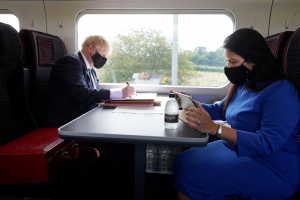Support migrant centric journalism today and donate

By Sanwar Ali:
In a world fraught with conflict and persecution, the demand for asylum is ever-increasing. Asylum is a fundamental human right, granting safety to individuals fleeing persecution and violence. However, the system is not without its challenges and criticisms. Recently, the UK Home Secretary, Suella Braverman, made a controversial statement regarding the need for asylum reform and raised questions about the existing international refugee law. This article provides an analysis of Braverman's remarks, the ensuing debate, and the potential implications of her proposed changes.
Braverman's Call for Asylum Reform
Suella Braverman, the UK Home Secretary, has been vocal about her views on the current state of the asylum system. In a recent speech delivered in Washington DC, she argued that the asylum framework, as it currently stands, is outdated and in need of reform. She emphasized that the 1951 Refugee Convention, which forms the backbone of international refugee law, was not designed for the challenges of the present day.
Braverman's argument hinges on the assertion that the Convention was created at a time when global movement was limited, and the internet was non-existent. Today, both of these factors have significantly changed, influencing patterns of migration and asylum-seeking in unprecedented ways. She posited that these changes necessitate a reevaluation of the Convention and a reassessment of who qualifies for asylum.
The Refugee Convention and the Debate on Persecution vs Discrimination
A key point in Braverman's argument is the distinction between "persecution" and "discrimination." The 1951 Refugee Convention provides protection for individuals who are facing serious threats to their life or freedom due to factors like race, religion, nationality, membership of a particular social group, or political opinion. However, Braverman argued that fear of discrimination should not qualify someone for asylum. She stated, "We will not be able to sustain an asylum system if, in effect, simply being gay, or a woman, or fearful of discrimination in your country of origin, is sufficient to qualify for protection."
This statement sparked a wave of criticism, with many arguing that discrimination can lead to persecution and that denying asylum to individuals facing discrimination contradicts the spirit of human rights.
Criticisms of Braverman's Remarks
Braverman's remarks have been met with strong criticism from various quarters, including refugee organizations, legal experts, and politicians. The UN's refugee agency, UNHCR, defended the Refugee Convention, stating that it remains a crucial instrument for ensuring the safety and protection of individuals fleeing conflict and persecution. The agency emphasized that the need is not for reform, but for stronger and more consistent application of the Convention and its underlying principle of responsibility-sharing.
Amnesty International UK's Chief Executive, Sacha Deshmukh, described Braverman's comments as a display of "cynicism and xenophobia," stressing that the Refugee Convention continues to be a crucial human rights instrument that saves millions of lives. He urged Braverman to focus instead on creating a functional UK asylum system that addresses the existing backlog of asylum cases.
The UK's Asylum Backlog and Proposals for Reform
The UK has been grappling with a significant backlog of asylum cases. As of June 2023, there were more than 215,000 pending asylum cases, including cases awaiting an initial decision, those awaiting an appeal outcome, and cases subject to removal action.
In response to the increase in arrivals and to address the UK's current asylum backlog, the UNHCR suggested strengthening and expediting decision-making procedures. This, they argue, would accelerate the integration of those found to be refugees and facilitate the swift return of those who have no legal basis to stay. The agency has presented the UK Government with concrete and actionable proposals in this regard and continues to support constructive, ongoing efforts to clear the current asylum backlog.
Consequences of Braverman's Proposed Reforms
Braverman's call for asylum reform raises questions about the potential consequences of her proposed changes. Restricting the criteria for asylum could deny protection to individuals who genuinely need it, potentially resulting in serious human rights violations. It might also lead to an increase in irregular migration, as individuals denied asylum might resort to more dangerous routes to reach safety.
Ethical Implications of Braverman's Rhetoric
Beyond the practical implications of Braverman’s proposed reforms, there are also ethical considerations. Her rhetoric about asylum seekers could potentially stigmatize them further, creating an environment of hostility and fear. It is crucial to remember that individuals seeking asylum are human beings, deserving of respect, dignity, and protection. The tone and content of public discourse about asylum seekers can significantly influence public opinion and policy outcomes.
Conclusion
Braverman's call for reform and her proposed solutions and rhetoric have been met with significant criticism.
The UK, like all nations, has a responsibility to protect those fleeing persecution and violence. As such, any changes to the asylum system must be carefully considered, ensuring the protection of human rights, upholding international law, and maintaining the integrity of the asylum process.
The debate on asylum reform is far from over, and it is crucial for all stakeholders, including politicians, legal experts, and the public, to engage in a thoughtful and informed discussion on the issue.
How Workpermit.com Can Help with Sponsor Licences
If you need help with employing Skilled Workers and applying for a Sponsor Licence, including complying with your Sponsor Licence obligations, HR responsibilities, etc workpermit.com can help.
For more information and advice, please contact us at 0344 991 9222 or at london@workpermit.com(link sends e-mail)





















